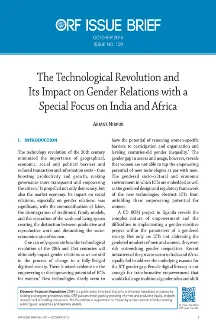The technology revolution of the 20th century minimised the importance of geographical, economic, social and political barriers and reduced transaction and information costs thus boosting productivity and growth, making governance more transparent and empowering the citizen. It propelled not only democracy, but also the market economy. Its impact on social relations, especially on gender relations, was significant, with the commodification of labor, the disintegration of traditional family models, and the separation of the work and living spaces creating the distinction between productive and reproductive work and diminishing the socioeconomic status of women.
One can only speculate how the technological revolution of the 20th and 21st centuries will ultimately impact gender relations as we are still in the process of change to a fully-fledged digitised society. There is mixed evidence on the empowering or disempowering potential of ICTs for women. New technologies clearly seem to have the potential of removing women-specific barriers to participation and organisation and leveling centuries-old gender inequality. The gender gap in access and usage, however, reveals that women are not able to tap the empowering potential of new technologies at par with men. The gendered socio-cultural and economic environment in which ICTs are embedded as well as the gendered design and regulatory framework of the new technologies obstruct ICTs from unfolding their empowering potential for women.
A CD ROM project in Uganda reveals the complex nature of empowerment and the difficulties in implementing a gender-sensitive project within the parameters of a gendered society. Not only are ICTs not addressing the gendered mindsets of men and women, they even risk entrenching gender inequalities. Recent initiatives of the private sector in India and Africa equally fail to address the underlying reasons for the ICT gender gap. Female digital literacy is not enough for transformative empowerment that would challenge traditional gender roles and shift the balance of power within our societies. If ICTs are to empower women, they have to be designed in a manner that suits female skills and interests, and must be embedded in a regulatory framework that favors female access and usage. Only if ICTs fulfill this ambitious agenda will their potential for women empowerment unfold.
The views expressed above belong to the author(s). ORF research and analyses now available on Telegram! Click here to access our curated content — blogs, longforms and interviews.

 PDF Download
PDF Download



 PREV
PREV

